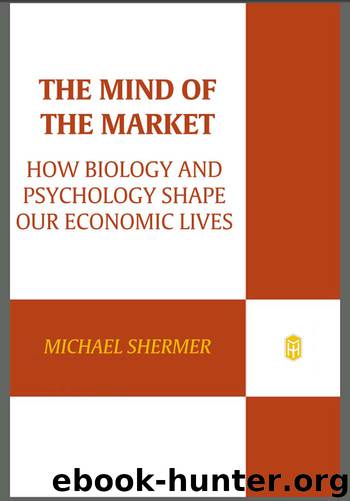The Mind of the Market by Michael Shermer

Author:Michael Shermer
Language: eng
Format: epub
ISBN: 9780805089165
Publisher: Henry Holt and Co.
Happiness is a subjective state of well-being that depends on relative frames of reference, grounded in an evolved psychology that finds meaning in the simple social pleasures and purposes of life. To cut to the chase, two decades of extensive research on Subjective Well-Being from around the world has revealed what brings most people the most happiness: social bonds (marriage, friendships, social circle), trust in people (friends, family, and strangers), trust in society (the economy, justice, government), religion and spirituality (prayer, meditation, positive psychology), and prosocial behavior (helping others, aiding the needy, volunteering). The reason why money can’t buy you happiness, but family, friends, and purpose can, is that these things are tapping into the environment of our evolutionary adaptation—the Middle Land of our Paleolithic past—where social bonds, trust, and helping others in the group were critically important to the survival of a diminutive social primate species struggling to endure and compete against other social primate groups, against predators, and against an unforgiving environment.
In the previous chapter, I argued that evolution designed us to value kin over nonkin, friends over strangers, and in-group members over out-group members. The emotional differences we feel about these various categories of people reflect a rational calculation conducted over the evolutionary eons. Emotions are proxies for getting us to act in ways that lead to an increase in reproductive success. Just as we do not need to compute the caloric value of food, the genetic value of mates, or the moral value of others, positive emotions like attachment and love guide us toward committing to a monogamous relationship in order to better ensure the survival of our genes into future generations, and negative emotions such as jealousy clue us in to the dangers of investing in someone else’s genes. We don’t need to do these calculations because evolution has done them for us and we have only to let our emotions guide us.
Negative emotions, by contrast, evolved as adaptations to threats faced by our Paleolithic ancestors. Anger leads us to strike out, fight back, and defend ourselves against danger. Fear causes us to pull back, retreat, and escape from risks. Disgust directs us to expel that which is bad for us. Computing the odds of danger in any given situation takes too long. We need to react instantly. Positive emotions, by contrast, have more long-term evolutionary benefits. Barbara Fredrickson, a psychologist who directs the Positive Emotions and Psychophysiology Laboratory at the University of Michigan, suggests that positive emotions help us build enduring personal resources, including intellectual resources (problem-solving skills, acquiring new information), physical resources (coordination, strength, health), psychological resources (resilience, optimism, sense of identity), and especially social resources (reinforce old bonds, create new bonds). Positive emotions, says Fredrickson, “can transform people for the better, making them more optimistic, resilient, and socially connected. Indeed, this insight might solve the evolutionary mystery of positive emotions: simply by experiencing positive emotions, our ancestors would have naturally accrued more personal resources. And when later faced with threats to life
Download
This site does not store any files on its server. We only index and link to content provided by other sites. Please contact the content providers to delete copyright contents if any and email us, we'll remove relevant links or contents immediately.
International Integration of the Brazilian Economy by Elias C. Grivoyannis(111059)
The Radium Girls by Kate Moore(12028)
Turbulence by E. J. Noyes(8049)
Nudge - Improving Decisions about Health, Wealth, and Happiness by Thaler Sunstein(7706)
The Black Swan by Nassim Nicholas Taleb(7129)
Rich Dad Poor Dad by Robert T. Kiyosaki(6632)
Pioneering Portfolio Management by David F. Swensen(6300)
Man-made Catastrophes and Risk Information Concealment by Dmitry Chernov & Didier Sornette(6019)
Zero to One by Peter Thiel(5802)
Secrecy World by Jake Bernstein(4753)
Millionaire: The Philanderer, Gambler, and Duelist Who Invented Modern Finance by Janet Gleeson(4478)
The Age of Surveillance Capitalism by Shoshana Zuboff(4292)
Skin in the Game by Nassim Nicholas Taleb(4248)
The Money Culture by Michael Lewis(4207)
Bullshit Jobs by David Graeber(4190)
Skin in the Game: Hidden Asymmetries in Daily Life by Nassim Nicholas Taleb(4006)
The Dhandho Investor by Mohnish Pabrai(3765)
The Wisdom of Finance by Mihir Desai(3747)
Blockchain Basics by Daniel Drescher(3583)
